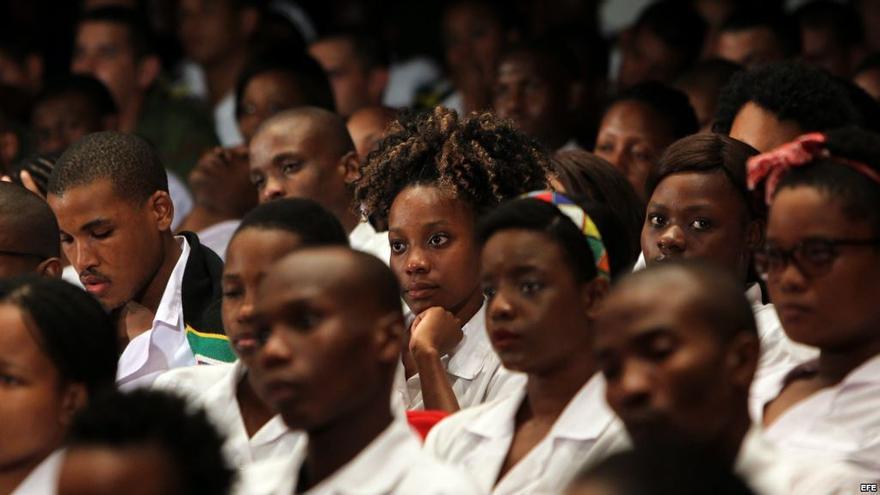
![]() 14ymedio, Madrid, 2 August 2021 — The Democratic Alliance (DA) party of South Africa, opposed to the Government, asked the South African Department of Health on Monday to take the necessary steps to return to their country 500 medical students stranded in Cuba in deplorable conditions.
14ymedio, Madrid, 2 August 2021 — The Democratic Alliance (DA) party of South Africa, opposed to the Government, asked the South African Department of Health on Monday to take the necessary steps to return to their country 500 medical students stranded in Cuba in deplorable conditions.
The young people, who completed their fifth year of career on the island, barely survive on the bare minimum, News24 published.
The students were scheduled to travel back to South Africa last year, but that did not happen. In June, the local media reported on the critical situation of some young people, who in some cases even “had to sell their clothes to get money” because they did not receive the stipends that the government of their country was supposed to send.
Medical studies in Cuba for South Africans last six years, including a preparatory year for Spanish language classes. During this period, they are allowed to go home twice on vacation.
The students told News24 that the Health Department refused to organize commercial flights and their departure was postponed until August 5.
The spokesman for the Department, Popo Maja, insisted that two charter flights had been guaranteed to take the young people back at the end of July, but that the flights were delayed “because the students demanded that they be paid their stipend before boarding the flight.”
“The stipend has not been paid due to challenges in the transfer of funds to Cuba, which are beyond the control of the department,” Maja excused himself, while assuring that the matter was “being addressed” with the Department of International Relations and Cooperation and the Treasury.”
“The government’s argument is that international payments to students go through the financial systems of the United States and, as there is an embargo on Cuba, the money has been paid but has not reached the hands of the students,” Deputy DA Haseena Ismail said on Monday, calling what is happening government “mismanagement and planning”.
Ismail noted that “the Nelson Mandela-Fidel Castro Medical Collaboration Program was established to provide students from poor and disadvantaged backgrounds the opportunity to study in Cuba with full scholarships,” but that “it has been plagued with failures since its inception, leaving students stranded in a foreign country without sufficient stipends, poor quality accommodation and food, and limited access to essential items such as toiletries and sanitary napkins.”
The deputy asserted that the South African government cannot continue to send students to the island “just to leave them with the minimum necessary to survive.”
Already last March, the South African press had reflected the precarious situation of the scholarship recipients, reporting that government sources maintained that to say that the program was not working as planned was to put it mildly.
“The dream (…) has turned into a nightmare due to the doubling of food prices in the socialist country, terrible living conditions and lack of access to sanitary articles,” The South African said at the time.
The South African government had to take action and send food after initially telling families to send suitcases of food.
The medical exchange agreements between the Island and South Africa come from 1997 and include the sending of professionals to the African country, the purchase of medicines from BioCubaFarma and the training of health workers on the Island. It is estimated that as a result of these agreements more than 1,500 South Africans have graduated from Cuban universities.
Be that as it may, Cuban cooperation in South Africa has been a source of scandals for more than a year, the most serious of which is that the South African Armed Forces invested more than 17 million dollars in illegally importing interferon alfa-2b, alleging they feared the coronavirus could be germ warfare.
Last July, the South African teachers’ union complained that specialists from the island hired by the Department of Basic Education to train South African teachers earn 800,000 rand a year (almost $56,000), a figure much higher than the salary paid to local teachers.
The complaints joined those of local doctors and engineers, who were also underpaid relative to their Cuban colleagues, through controversial agreements. Engineers from that country denounced at the time the hiring of Cuban specialists who are not even authorized to assist the Department of Water and Sanitation.
The unions had access to the agreements, which reveal that Cuban engineers cost almost $22,000 more a year than local workers, who even have to supervised by them, especially in a country with unemployment of more than 30%.
Good relations between Cuba and South Africa began with the rise to power of Mandela, but have continued seamlessly with his successors, Thabo Mbeki (1999-2008), Jacob Zuma (2008-2018) and the current president, Cyril Ramaphosa.
____________
COLLABORATE WITH OUR WORK: The 14ymedio team is committed to practicing serious journalism that reflects Cuba’s reality in all its depth. Thank you for joining us on this long journey. We invite you to continue supporting us by becoming a member of 14ymedio now. Together we can continue transforming journalism in Cuba.
